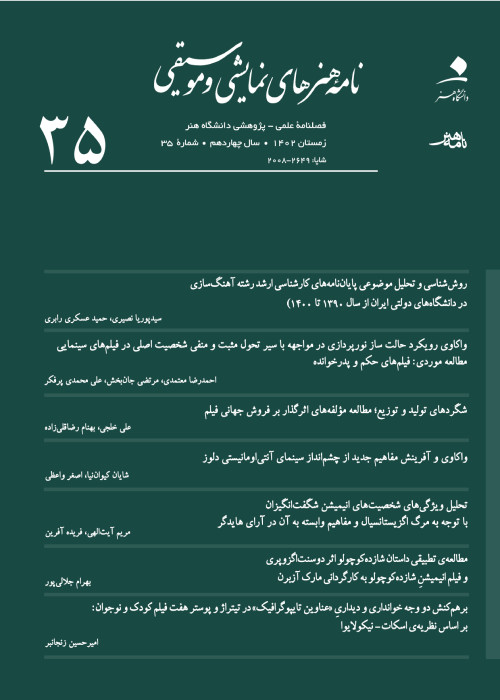Comparative Analysis of Taxi Driver and Apocalypse Now Movies Based onthe Concept of Violence in Foucault’s Discourse
Focusing on dominant discourses in every era suggests rejecting other conversations. Trails of deep violence can be found on this occasion. The discourse, as Michel Foucault seeks, examines the set of dominant criteria and values in each period and subsequently attends the principle and values that are rejected and neglected by the power structure in that period. However, those values still exist. This concept of denial is a concept of violence, which uses many power structures in discursive forms to confirm some and reject the others. Regarding the process of meaning transfer in cinema, it seems that the cinema as a structure of power has also been able to integrate the subject based on concepts and features such as assembly, fetishism, gaze, and apparatus characteristics and give it a special sense of identity. Cinema has directed the viewer’s viewpoint towards a particular ideology by introducing its idea as a reality dominating a certain discourse and eliminating other conversations. Denying the Subjectivation right of the subject and thus denying the right to produce meaning by the spectator in the cinema means giving him a particular ideology and preventing the perception of the meaning by the spectator himself. When comparing the two films Apocalypse Now (1979) and Taxi Driver (1976) of the United States in the 1970s , using a comparative, descriptive and analytical method and collecting information based on library studies in addition to expressing the similarity of the type of discourses, occurrences and their effects of violence by the ruling ideology, the distinction between the use of the feature of cinematic apparatuses has also been pointed out. In this regard, the concept of violence from the perspective of Michel Foucault was first addressed in the Book of “Discipline and punish”: It deals with the birth of the prison and refers to the difference in the two forms of violence, especially physical violence. It then describes how the concept of violence in the history of cinema and Eisenstein’s montage theory and the idea of a cinematic apparatus as the main tool of film violence that identifies the viewer by hiding the process of meaning in the cinema. Discourses, socio-political protests, and civil movements of the 1970s have also been described. Finally, by comparative analysis of the two films, Taxi Driver and the Apocalypse Now, the similarity of the racist discourse in both films and the following violence is expressed. Then it is explained how the occurrence of the subject’s violence on itself, as well as the existence of sacred and religious discussions in both films, has been considered as propositions for fixing the discourse of films and then examining the role of the image and cinema in both films. At the end of the comparison, it has been established that the cinematic apparatus can operate in two different ways. It can be more flexible to create illusion and incitement to reality using its violent nature and act in two different ways.
- حق عضویت دریافتی صرف حمایت از نشریات عضو و نگهداری، تکمیل و توسعه مگیران میشود.
- پرداخت حق اشتراک و دانلود مقالات اجازه بازنشر آن در سایر رسانههای چاپی و دیجیتال را به کاربر نمیدهد.



